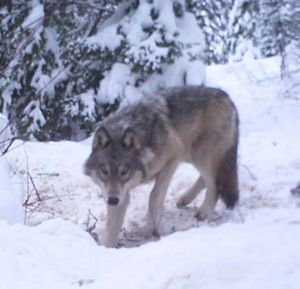Tab for Huckleberry wolf pack operation $53K
ENDANGERED SPECIES -- Washington wildlife officials estimate they spent about $53,000 this summer to deal with the Huckleberry Pack attacks on a flock of 1,800 sheep on a grazing allotment in Stevens County.
The costs were almost equally split between the effort to prevent attacks that killed at lest 24 sheep and the mission with a helicopter shooter to kill some members of the pack. One wolf was killed.

Most of the costs for managing wolves in Washington are funded by $10 from each sale of a personalized vehicle license plate, a dedicated funding source approved by the Washington Legislature.
In 2013, the state spent $76,500 two remove all eight members of the Wedge Pack in northern Stevens County after they had killed more than a dozen cattle.
So far in 2014, Washington Department of Fish and Wildlife officials have confirmed that wolves in three of the state's 13-15 confirmed packs have killed 33 sheep, two cattle and one dog.
Although a breeding female in the Huckleberry Pack was killed by a government shooter in August, the pack of at least five animals still roams the region in and north of the Spokane Indian Reservation.
To deal with the pack, agency Wildlife Program Director Nate Pamplin says the state will:
- Continue outreach to other livestock producers in the area.
- Try to coordinate radio collar data (a male wolf is collared) from the Spokane Tribe.
- Monitor pack movements.
- Attempt to collar more pack members
- Prepare preventative measures for next grazing season
- Continue dialogue with producer Dave Dashiell regarding compensation sheep lost this year.
And to spice up the challenge, a new Profanity Pack, has emerged into the spotlight with confirmed attacks on cattle.
A public meeting on wolf management in northeast Washington with state Fish and Wildlife officials is set for 6 p.m. on Oct. 7, in the Colville Ag Trade Center at the Northeast Washington Fairgrounds, 317 W. Astor Ave.
After an update on wolf status and management in the area, meeting participants will be able to comment and ask questions of WDFW Director Phil Anderson, Eastern Regional Director Steve Pozzanghera and other department staff.
WDFW actions this summer to protect sheep from the Huckleberry pack are described in a question-and-answer document on the department’s website.
In 2011, the U.S. Fish and Wildlife Service removed gray wolves from the federal list of endangered species in the eastern third of the state, but the species is still protected under Washington state law. The state Wolf Conservation and Management Plan and state laws set the parameters for responding to wolf predation on livestock.
Pamplin told the state Fish and Wildlife Commission on Friday that the agency is feeling the squeeze of groups on both sides of the wolf issue. Pro-wolf groups and livestock producers have charged the agency with mismanagement of wolves in the state.
Wolf advocates -- who have petitioned Gov. Jay Inslee to clamp down on any WDFW decisions to kill wolves to protect livestock -- want the state to use more non-lethal tools to prevent livestock depredations. They want stock moved if they come in conflict with wolves, criticize the agency's lack of transparency on wolf control say they agency's responses have impacted the recovery of wolves in the state.
Livestock interests -- and the Stevens County Commission, which has issued two resolutions condemning attacking wolves and state wolf management -- point out the WDFW has the legal obligation to kill wolves that threaten livestock and should follow through in the case of the Huckleberry Pack. They are angry that wolves forced a producer to move his sheep off private property.

